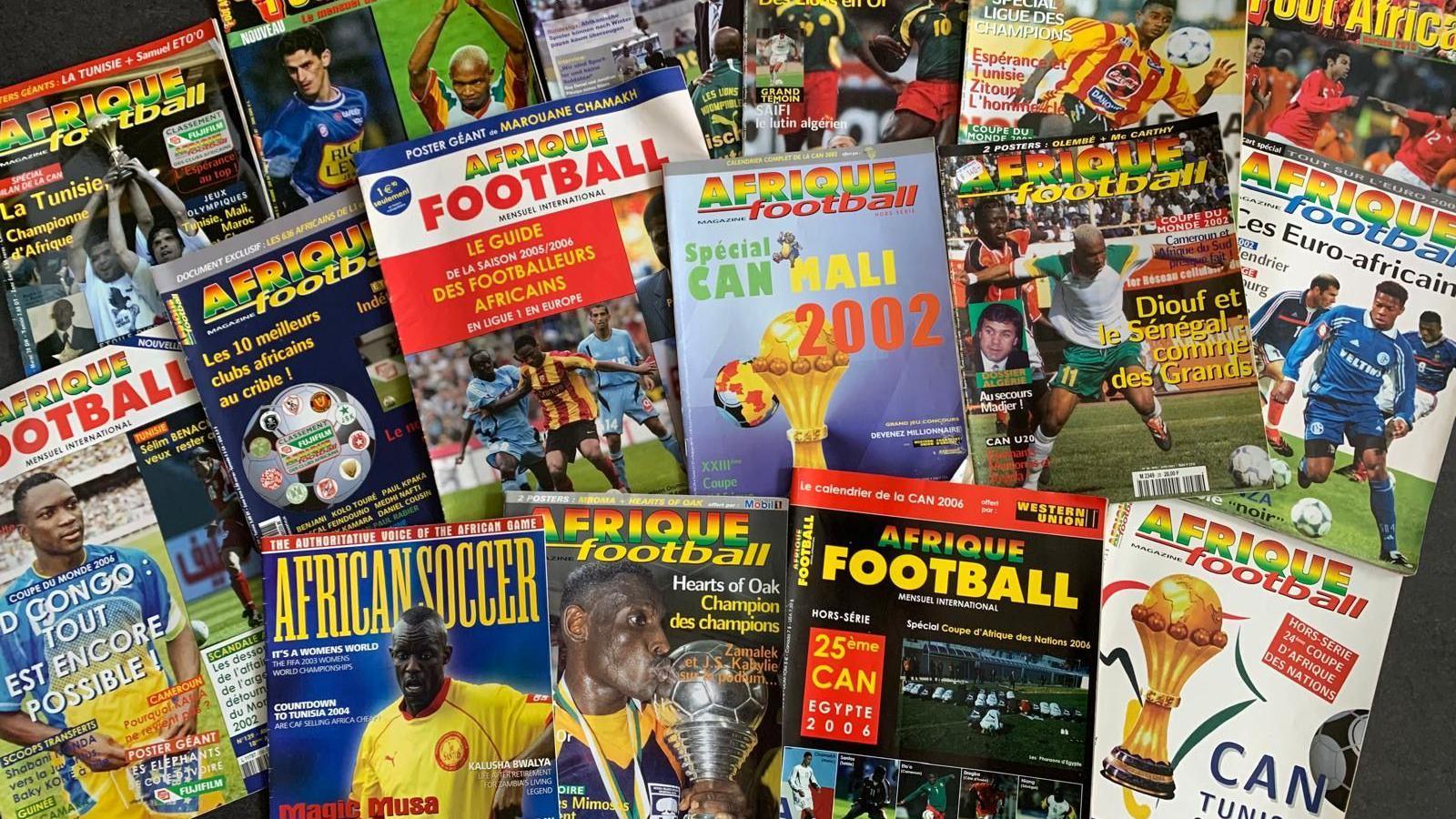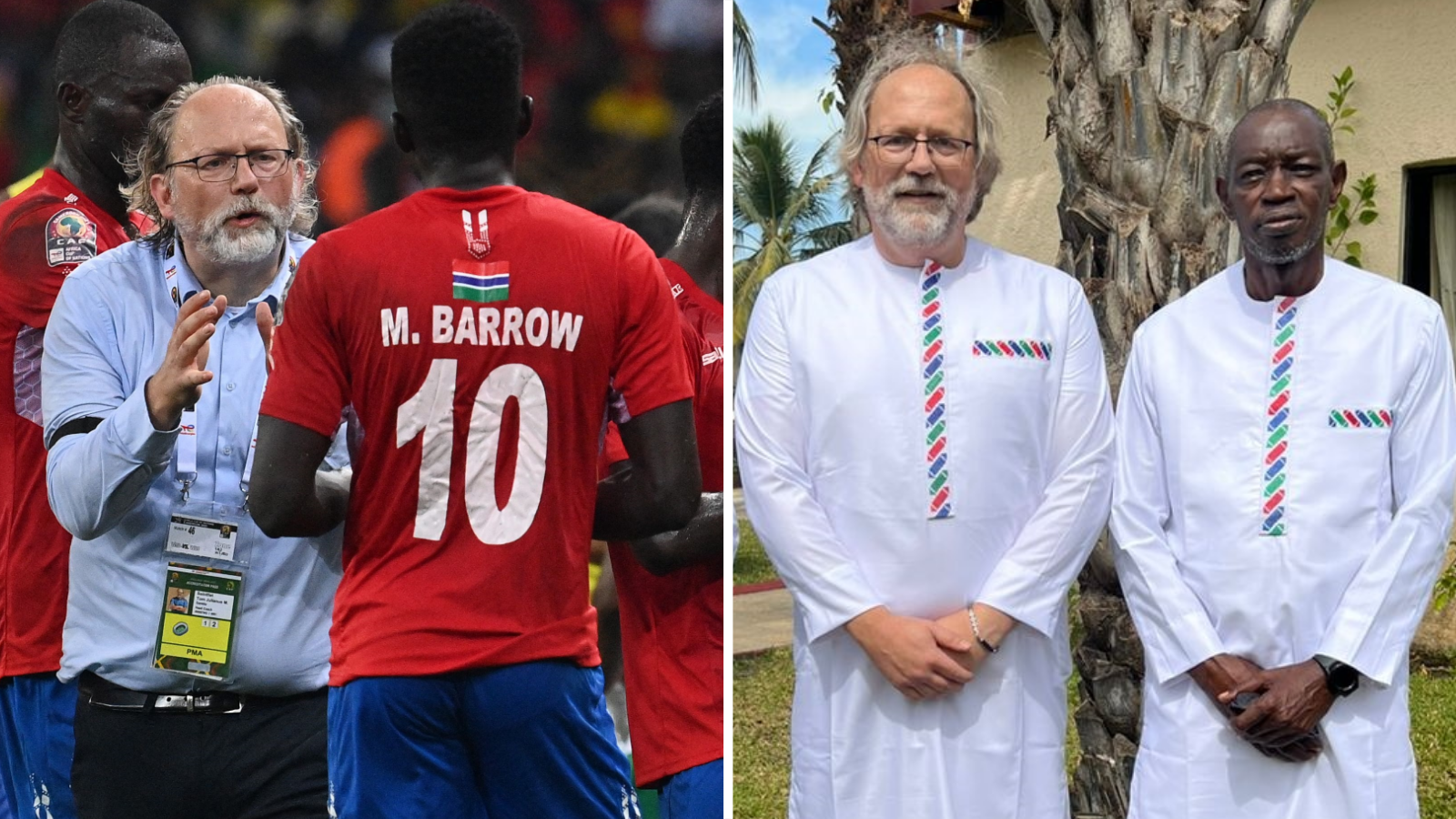The Belgian who fell in love with African football
Under Tom Saintfiet, The Gambia went from one of Africa's worst eight teams to one of its best. BBC Sport Africa spoke to the Belgian coach and his players to get the inside story
- Published
New Mali head coach Tom Saintfiet is a man with a passion for African football.
So it was little surprise when his latest job was announced, external - even if it meant quitting his role with the Philippines after only six months.
Unable to resist the lure of a continent he describes as "beautiful", the Belgian has previously managed Namibia, Zimbabwe, Ethiopia, Malawi, Togo and most notably The Gambia - who he led to a first ever Africa Cup of Nations (Afcon) - as well as having a short-lived stint as Nigeria's technical director.
Now he takes charge of a seventh African team, one that has made an indifferent start to its 2026 World Cup qualification campaign.
For the 51-year-old, however, it presents a chance to fulfil his dream of leading an African nation at football's ultimate showpiece event.
“With the right coach and the right tactical approach and preparation, they can go to a World Cup to become world champions,” he told BBC Sport Africa of the continent's sleeping giants.
“Look at where their players play, the qualities they have. You can't tell me that France, England, Argentina or Brazil are always better.
“Maybe if they play 10 times against each other, Brazil win seven times. But it's not about those 10 times – it's about that one time.”
What to expect from next Fifa World Cup in 2026
- Published20 December 2022
How does new African World Cup qualifying work?
- Published14 November 2023
Saintfiet's chances have been greatly enhanced by the fact that Africa will have at least nine representatives at the expanded World Cup in Canada, Mexico and the USA - a tournament that will be the first to include 48 teams, up from 32 at the last edition in Qatar where five African nations participated.
Morocco’s semi-final run in 2022 proved they can compete, yet Saintfiet sees beyond the established heavyweights, naming his Mali side and DR Congo among those with “huge potential” should they reach the finals.
But for foreign coaches like himself to be successful he feels they must fully immerse themselves.
“Their career is blown out in Europe and they see it as ‘OK, I need to work, I need to earn money – let's go to Africa.'
“But they don’t go with the passion, not with the heart," he said.
"You get coaches who don't live on the continent, who don't understand and respect the culture and religions, who don't know how to work with it and ask for a lot more money than local coaches. And they most likely don't bring the results.”
Passion, 'treasured' magazines... and faxes

Saintfiet still treasures his personal collection of Afrique Football magazines, which he would travel to larger cities in Belgium to buy as a young coach
Saintfiet's love of African football dates back to 1982 when he was just nine years old.
His first football memory came in the form of Algeria and Cameroon players in a World Cup sticker book, attracted by the names and kit designs, while as he grew older he slaked his thirst for knowledge with copies of the hard-to-find Afrique Football magazine.
Decades on, he still keeps them all.
"I treasure them," he admitted. "There was no internet, so they gave you the information.
“I bought it in the ‘90s and the beginning of the 2000s."
Already a head coach by the age of 24, he did not wait long before making his first attempt to move to Africa.
“I then applied - this 26-year-old guy - for the Zimbabwe job with a fax. I still have the fax paper and their reply.”
Saintfiet was well into his thirties before the fax machine finally paid off, with Namibia appointing him in 2008.
His journey since has been eventful on and off the pitch, building a reputation for lifting results and expectations from a low base - something best illustrated by his time with The Gambia between 2018 and 2023.
“I was telling the president and the vice president that I'm here to qualify,” he said of his ambitions.
“And they both looked at me surprised and said ‘coach, we didn't win for five years – please, let's first try to win a match.’
“They didn't believe me because they had never qualified for a tournament in 60 years. The belief was, at that moment in time, almost zero.”
'I want to write history'

Tom Saintfiet led an impromptu training session at Brussels Airport when The Gambia's plans went awry on their way to a historic Africa Cup of Nations qualifying win
Not only did Saintfiet help The Gambia reach the 2021 Nations Cup, he led them to the quarter-finals where they were ultimately beaten by hosts Cameroon.
But there were “very strange” moments along the way – including one in the build-up to their historic win over Angola that sealed qualification.
"Four days before the most important game in the history of Gambian football, they forgot to arrange the plane,” he revealed.
“We were doing exercises between the parked cars outside Brussels Airport on the parking lot.
“In my first month, I had been the angry man who always complained about everything, because I really wanted everything up to a standard.
“But I said OK, if I now focus on what went wrong, I give my team an excuse to fail.’ And I didn’t want to fail.
“I took the job because I was 100% sure that I could build something with potential players. They were 172nd in the world but I really knew I could do more.”
Saintfiet then repeated the trick by helping continental Africa's smallest nation also qualify for the 2023 Afcon, but left his job after losing all three group games.
Despite talks with Cameroon and Ghana, he moved to Asia, hoping to "achieve miracles" with another footballing minnow, the Philippines.
But even during his brief time in charge, he said that: "The ambition is still to return to Africa in the long term.
“That’s my big aim - to write history. And writing history now means doing better than Morocco did in the last World Cup.”
'The dream is not fulfilled'

Saintfiet says embracing African passion and culture on and off the pitch is crucial if foreign coaches want to have success
Saintfiet's time in Africa has brought him more than footballing success.
Married to a Zimbabwean and with a young daughter, his family now has blood ties to the continent.
"You need also a partner who understands the business," he said.
"It's not a nine to five job. It's not a job where you have stability.
"She is also an advisor to me when it's about cultural habits, about how people behave, how you can talk to people."
And he believes his experiences coaching across the world have broadened his horizons in other ways.
“When you're born and grow up somewhere, you think that your way is the way it goes,” he reflected.
“Not only in football – in everything in life. It's sometimes nice to see different sides of life and be open to different ideas. It makes life richer.
"I'm still in touch with people in all the countries I worked.
"We are friends for life, we respect each other."
Saintfiet now has the opportunity to make new friends in Mali.
His opening fixtures come in the form of September's opening qualifiers for the 2025 Nations Cup, taking on Mozambique and Eswatini.
But he is certain to have one eye on March's pivotal World Cup qualifiers away to Comoros and the Central African Republic.
Mali currently sit fourth in Group I with five points from four games - four points behind group leaders Comoros. Only the group winners are guaranteed a place in North America for the finals.
“The dream is not fulfilled," he said ahead of taking the job. "The World Cup is still the most important thing.”